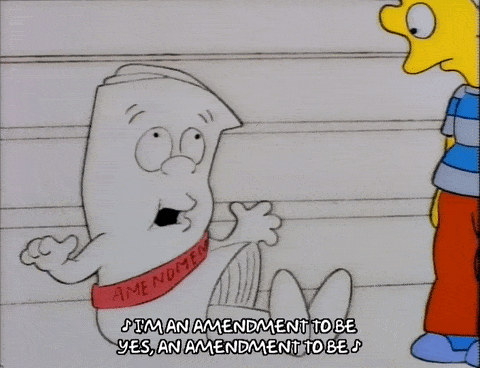⚖️ Leave the bikers
To: Hearsay Readers
Today’s update includes:
Hells Angels wave goodbye to clubhouses
Alberta Courts caution parties on use of AI
Saskatchewan tables pronoun legislation
Nun charged for residential school sex offences
— Dylan Gibbs
LEAVE TO APPEAL
Supreme Court refuses leave, securing forfeiture of Hells Angels’ clubhouses

Gif by TheGentlemen on Giphy
The Hells Angels Motorcycle Club has been duking it out with BC’s Director of Civil Forfeiture since November 2007. The 16-year saga centred on three of the biker gang’s clubhouses, which the Director said were linked to crime and should be forfeited to the government.
After the BC Court of Appeal sided with the Director in February, the Club’s only remaining hope to keep the clubhouses was a further appeal to the Supreme Court of Canada. That hope was extinguished yesterday, when the SCC refused leave to appeal.
Spotlight on Court of Appeal Decision
The BC Courts addressed enough legal issues in the course of these proceedings to make your head spin. Never mind pre-trial motions, the trial judgment alone was a whopping 1502 paragraphs. But the slightly more manageable Court of Appeal judgment — weighing in at 332 paragraphs — dealt with two broad issues:
Did BC have authority to enact the Civil Forfeiture Act?
Were the Hells’ Angels’ clubhouses “likely to be used to engage in [future] unlawful activity”?
Legislative authority: BC’s Civil Forfeiture Act applies to proceeds of crime and instruments used for crime. The Hells Angels argued the provisions dealing with “instruments of crime” effectively regulate criminal law — an area of exclusive federal jurisdiction. The Court of Appeal disagreed, concluding those provisions regulate property and civil rights, not criminal law. The SCC reached the same conclusion about the “proceeds of crime” provisions in Ontario’s civil forfeiture legislation back in 2009.
Unlawful activity: The Director argued the clubhouses were likely to be used as instruments of unlawful activity at some point in the future. The Act also applies to instruments used for crime in the past - but that wasn’t the Director’s line of attack.
The trial judge wasn’t convinced. He took a restrictive view of “future use” and wasn’t prepared to draw inferences about the Hells Angels’ future criminal activity based on their past conduct.
The Court of Appeal felt differently. The Court said the Hells Angels directed violence, looked for members that would engage in crime, and worked hard to avoid law enforcement. The clubhouses stored information, which helped the Club commit unlawful acts and avoid prosecution. The clubhouses were also outfitted to prevent police monitoring, providing a safe space to engage in criminal conspiracy. Those facts in mind, the inference of future criminal activity was “inescapable”.
So, the Court of Appeal turned the clubhouses over to the Director.
Hard pass: Why’d our top court turn their noses up at this one? Interesting facts aside, it just doesn’t scream public importance. The constitutional issue is interesting, but it doesn’t warrant a second look given the SCC’s previous ruling on a similar regime in Ontario. The rest of the decision involves a fairly routine exercise in statutory interpretation, with issues specific to BC.
Plus, fool me once: the SCC granted leave to appeal on a wiretap issue stemming from this same dispute back in 2013. The Hells Angels abandoned the appeal before the Court had a chance to hear it.
Writing on the wall: When the second paragraph of an appeal decision “acknowledges” the trial judge’s “monumental piece of work”, it’s a good sign they’re going to overturn it. Opening with a compliment is a big brain move.
Decision Report Card:
◻️◻️◻️😃◻️ Factual interest
◻️◻️🙂◻️◻️ Legal interest*
◻️◻️◻️◻️🐭 Uses of the word “snitch”
*evidently not interesting enough for the SCC
TECHNOLOGY
“With great power comes great responsibility” ‑ Alberta Courts on AI

Alberta’s Courts are the latest to publish direction on using Chat-GPT and similar tools to prepare legal submissions. Earlier this year, a Manhattan judge fined two lawyers over the use of fabricated decisions in a legal brief written by Chat-GPT. That prompted several courts to publish statements about lawyers using technology to assist with submissions — Alberta now included.
Alberta’s approach is to urge caution and to require human oversight. The notice states that “AI-generated submissions must be verified with meaningful human control” and reminds parties they should only rely on authoritative sources.
Other courts, including the Supreme Court of Yukon and the King’s Bench of Manitoba, have instead required litigants to disclose their use of artificial intelligence:
[I]f any counsel or party relies on artificial intelligence (such as ChatGPT or any other artificial intelligence platform) for their legal research or submissions in any matter and in any form before the Court, they must advise the Court of the tool used and for what purpose.
Potayto Potahto: Other courts will likely follow suit — so what’s the right approach? Directives like the Supreme Court of Yukon’s aren’t clear enough, because artificial intelligence is a broad concept without a precise definition. Surely we don’t need people disclosing their reliance on Google searches. Maybe courts can workshop the language to provide greater clearity, but hopefully more courts follow Alberta’s lead. Is it too much to ask for lawyers to read their materials?

King of the Hill - Fox
LEGISLATION
Saskatchewan tables pronoun legislation that will override Charter rights
Saskatchewan’s Conservative government tabled its anticipated pronoun legislation yesterday. Consistent with the messaging adopted by Premier Scott Moe and his Cabinet, Bill 137 will amend Saskatchewan’s Education Act to establish certain “parental rights”. Those rights include the right to receive information about their child (the entire school file), and to make decisions including by choosing what classes the child takes.
The most contentious part of the Bill is the part that says parents have a right to provide consent before a child under 16 uses a “gender-related preferred name or gender identity” at school. Under the new law, schools are not allowed to use a student’s gender-related preferred name or gender identity without first obtaining consent from the student’s parent or guardian.
Here’s the key portion of the Bill:

Thinking ahead: The government is also taking this opportunity to block any lawsuits that might arise from the legislation (see subsection 6, above). Hard to blame them — a judge has already concluded these changes will likely cause irreparable harm to children — who wants to pay for that?
HEARSAY ROUNDUP
🟧 Ontario Provincial Police charged 97-year-old Francoise Seguin for offences she allegedly committed at residential schools and day schools between 1960 and 1980. Seguin was a nun and teacher at St. Anne’s Indian Residential School in Fort Albany, among other locations.
🍻 Every province in Canada has adopted rules that punish people who drive with a blood alcohol concentration of .05 — except Quebec. And despite a recommendation from a Quebec coroner, Quebec’s Transport Ministry plans to keep it that way.
💉The BC Court of Appeal agreed to hear a group of appeals related to vaccine mandates, even though the appeals are moot. Vaccine mandates are over, but cases challenging government vaccine mandates continue progressing through the courts. So, do we still care? The Court said yes, because there’s a “significant possibility” similar orders will arise in the future, and the orders don’t last long enough to hear an appeal while they are still in force. That might be good news for Maxime Bernier, who advanced a similar argument in the Federal Court of Appeal this week.
👨⚕️Jason Aurélien really wants to be a nurse in Quebec, but he’s failed the licensing exam three times. He now wants to bring a class action on behalf of test writers. Aurélien is not the only one feeling personally victimized — the exam has a high failure rate and Quebec’s commissioner of professions concluded the exam is flawed. If the class action isn’t certified, maybe Aurélien will take up law instead.

Reply